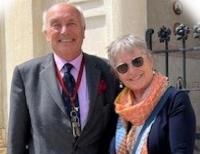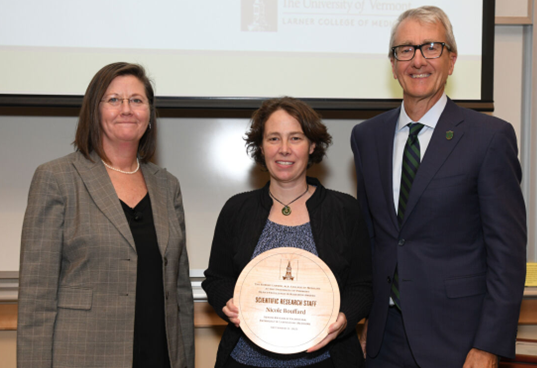Past Department Highlights
Congratulations to Dr. Scott Anderson, M.D., Professor, Department of Pathology & Laboratory Medicine, and Christina Kieslich, Pathologist Assistant, on receiving resident teaching awards for 2024. (7/2024)
Congratulations to Dr. Christi Wojewoda, M.D., Professor, Department of Pathology & Laboratory Medicine, on being appointed to a three year term to the Medical Curriculum Committee. This appointment recognizes Dr. Wojewoda's commitment to the educational mission, and the education of future physicians. (7/2024)
Congratulations to Dr. Bronwyn Bryant, M.D., Associate Professor, Department of Pathology & Laboratory Medicine, on being named the next recipient of the Ernest Hiram Buttles Professorship honoring a commitment to and excellence in the teaching of pathology. (7/2024)
Congratulations to the following individuals on their promotions effective July 1, 2024. Robert Wildin, M.D., promoted to Professor, Joanna Conant, M.D., promoted to Associate Professor,
and
Amer Abu Alfa, M.D., promoted to Associate Professor. (6/2024)
Congratulations to Lisa Kapoor on 40 years of service to the pathology department. (6/2024)
Bronwyn Bryant, M.D., Associate Professor, Department of Pathology & Laboratory Medicine, is featured on the People of Pathology Podcast- Episode 181: Redefining Pathology Training With Entrustable Professional Activities. (6/2024)
Pathology resident, Alayna Westcom, M.D., received the Distinguished Medical Student Award from The College of American Pathologists. The award recognizes a fourth-year medical student committed to pursuing
pathology residency. (5/2024)
Sharon Mount, M.D., Professor, Department of Pathology & Laboratory Medicine, presented a talk: “Autopsy in the USA: An update and interesting cases from the University of Vermont” at the University
of Padua in Padua, Italy on April 22, 2024. (5/2024)
Congratulations to Anne Stowman, M.D., assistant professor of pathology and laboratory medicine, on accepting the position as Network Vice Chair for Anatomic Pathology. (3/2024)
Congratulations to Ashley Volaric, M.D., assistant professor of pathology and laboratory medicine, on receiving a Physician-Scientist Pilot Award through the Translational Global Infectious Disease Research (TGIR Group) for her
research on Epstein-Barr virus (EBV) epigenetics of diffuse large B-cell lymphomas in sub-Saharan Africa. (3/2024)
Congratulations to Rebecca Wilcox, M.D., associate dean for faculty affairs, and professor of pathology and laboratory medicine, on receiving The Polaris Award for Outstanding Mentorship, and Dr. Yvonne Janssen-Heininger, Ph.D.,
on receiving the Gender Equity Outstanding Achievement in Medicine & Science Award at the 5th Annual Celebration of Gender Equity in Medicine and Science Awards. This award honors a Larner College of Medicine faculty or staff member who provides
outstanding formal or informal mnetorship for women or gender diverse** college community members. Dr. Wilcox was nominated by Andrea Green, Julie Dumas, Alexandra Kalof, and LE Faricy. (2/2024) **Gender diverse refers to those who identify with a gender outside of the she/her, he/him binary
Congratulations to Dr. Brian Cunniff, Ph.D., assistant professor of pathology and laboratory medicine, the team in the Cunniff Lab, and industry partner , RS Oncology, on having their novel therapy enter Phase 2 Clinical trials.
Read more here Milestone for UVM-developed cancer drug. (2/2024)
During the annual Larner College of Medicine's Foundations Award Celebration, Amer Abu Alfa, M.D., assistant professor of pathology and laboratory medicine received The Dean Warshaw Integration Award recognizing the faculty member
whose teaching best captured the spirit of the Vermont Integrated Curriculum. Congratulations. Christina Wojewoda, M.D., professor of pathology and laboratory medicine and vice chair for education pathology, presented the
Ephraim Woll Award for Excellence in General Pathology to John Rustad. (2/2024)
Congratulations Dr. Bei Zhang, M.D., M.S., Ph.D., MLS(ASCP)CM, on January 17, 2024, is to receive the Educational Scholarship Award from the Teaching Academy Awards for Teaching and Educational Excellence.
This award recognizes an individual who has demonstrated a record of Quality, Quantity, and Engagement in medical education scholarship. Dr. Zhang, M.D., M.S., Ph.D., MLS(ASCP)CM, has been advanced to Distinguished Educator by the Teaching Academy
at LCOM. Congratulations also to Bronwyn Bryant, M.D., for advancing to the level of Master Teacher and Agnes Balla, M.D., on being inducted
as a Member. (1/2024)
Congratulations to University Scholar Mary Cushman, M.D., M.Sc., professor of medicine and pathology and laboratory medicine, on being ranked #90 in the U.S. and #144 in the world as one of the Best Female
Scientists in the World, by Research.com. Also, Dr. Cushman, M.D., M.Sc., recently delivered the Robert Reneman Lecture at the Cardiovascular Research Institute Maastricht (CARIM)'s 2023 symposium in The Netherlands. The tile of her talk was "Stroke
and Cognitive Impairment in a Biracial U.S. Cohort: The REGARDS Study." (1/2024)
In a recent Nature Methods paper, Doug Taatjes, Ph.D., Director of the Microscopy Imaging Center, and the Center for
Biomedical Shared Resources at the Larner College of Medicine, together with colleagues from the international consortium QUAREP-LiMi, proposed a set of standardized community-developed checklists to assist researchers, reviewers, and journal
editors with the goal of increasing the clarity and reproducibility of image figures and their analyses. The hope is that many journals will adopt these guidelines as part of their “Instructions for Authors”—providing a succinct
and easy to use checklist for authors when compiling images for reproduction and descriptions of image analyses performed. (11/2023) (from the LCOM Newsletter)
Congratulations to some of our residents and our fellowship student on having their abstracts accepted for the upcoming 2024 USCAP annual meeting in March. "Unexpected Cardiac Amyloidsis: Demographics, Histology, Distribution and Clinical Significance: A Review of 15 Autopsy Cases." (Jesse Mostoller, Neel Hedge, Nick Taylor). "GATA3 Positive Malignant Spindle Cell Neoplasm Involving the Liver Diagnosed as Metastatic Sarcomatoid Chromophobe Renal Cell Carcinoma at Autopsy." (Rae Nusapan). "Long Term Outcome in a Case of Tetralogy of Fallot Surgically Treated with Palliative Shunts: Findings from an Adult Autopsy." (Dore Guptil, Heather Giguere). (11/2023)
 Congratulations to Dr. Mark Fung, M.D., PhD.,
Professor Pathology and Laboratory Medicine, on receiving the 2023 College of American Pathologists (CAP) Lifetime Achievement Award. Dr. Fung is a nationally recognized expert in transfusion medicine. (10/2023)
Congratulations to Dr. Mark Fung, M.D., PhD.,
Professor Pathology and Laboratory Medicine, on receiving the 2023 College of American Pathologists (CAP) Lifetime Achievement Award. Dr. Fung is a nationally recognized expert in transfusion medicine. (10/2023)
Congratulations to Jessica Crothers, M.D., Assistant Professor Pathology and Laboratory Medicine, on achieving the Notice of Special Interest Team Science award from NIAID for: "Effects of the gut microbiota on oral vaccine response in adults and children." (10/2023)
 Congratulations to Nicole Bouffard on being awarded the "Scientific Research Staff Award" for 2023. This was presented to Nicole at the September 21, 2023, LCOM Research Excellence Award Ceremony. This is a great honor
for Nicole and the Department of Pathology and recognizes her contributions and importance to the department and MIC. (10/2023)
Congratulations to Nicole Bouffard on being awarded the "Scientific Research Staff Award" for 2023. This was presented to Nicole at the September 21, 2023, LCOM Research Excellence Award Ceremony. This is a great honor
for Nicole and the Department of Pathology and recognizes her contributions and importance to the department and MIC. (10/2023)
Congratulations to Brian Cunniff, Ph.D., Assistant Professor Pathology and Laboratory Medicine, on being awarded a $1.6 million R01 grant by the National Institute of General Medical Sciences to
study the role of mitochondrial trafficking in regulating cell migration, a key feature of metastatic tumors. (9/2023)
Congratulations to Yvonne Janssen-Heininger, Ph.D., Professor Pathology and Laboratory Medicine, on becoming a University of Vermont Cancer Center Program Co-Leader, Cancer Cell. (9/2023)
Congratulations to the following pathology members on receiving research support funds in April 2023. Recipients were: John Kennedy, M.D., $6520 for morphologic and immunohistochemical re-evaluation of renal cell carcinomas exhibiting papillary architecture, with emphasis on tumors demonstrating "type 2" morphology. Yvonne Janssen-Heininger, Ph.D.,
$15,000 for a joint initiative between RBP, UVM Cancer Center, and faculty in the Department of Chemistry. Megan Tarte $745 for Stem Cells, Cell Therapies, and Bioengineering in Lung Biology and Disease Conference. Albert van der Vliet, Ph.D.,
$14,400 for Redox processes in macrophage activation in IPF. (9/2023)
Congratulations to the following faculty members on their promotions: Vikas Anathy, Ph.D., to Professor with tenure, Bronwyn Bryant, M.D., to Associate Professor, John DeWitt, M.D., Ph.D.,
to Associate Professor, Sarah Nowak Ph.D., to Associate Professor, and Christi Wojewoda, M.D., to Professor. (6/2023)
Bei Zhang, M.D., M.S., Ph.D., MLS(ASCP), associate professor of pathology and laboratory medicine, did an educational scholarship session titled "Activate Students Learning Outside Classroom." at the
8th International meeting of the Association of Biochemistry Educators. Dr. Zhang also conducted two additional workshops with other ABE members titled "Linking Clinical Presentations to Their Biochemistry: A novel ABE Clinical-Biochemistry Curricular Treat Mapping Educational Tool.", and "Getting to Clerkship and Beyond: Crafting Biochemistry Learning Objectives that Connect and Integrate Basic Science Concepts with Clinical Application." (5/2023)
Congratulations to Dr. Maureen Harmon, M.D., associate professor of pathology and laboratory medicine, and Dr. Amer Abu Alfa, M.D., assistant professor of pathology and laboratory medicine for
being recognized by medical students for their professionalism. Dr. Harmon was recognized for social responsibility and Dr. Abu Alfa was recognized for compassion. (5/2023)
Congratulations to Mary Cushman, Ph.D., M.Sc., professor of medicine and pathology and laboratory medicine, on being named a University Distinguished Professor of Medicine, Hematology/Oncology Division,
and
Pathology and Laboratory Medicine. (5/2023)
View the story Mammograms of a study by Sarah Nowak, Ph.D.,
assistant professor of pathology and laboratory medicine, and researchers at the UVM Cancer Center showing data that fewer women being screened for breast cancer. (4/2023)